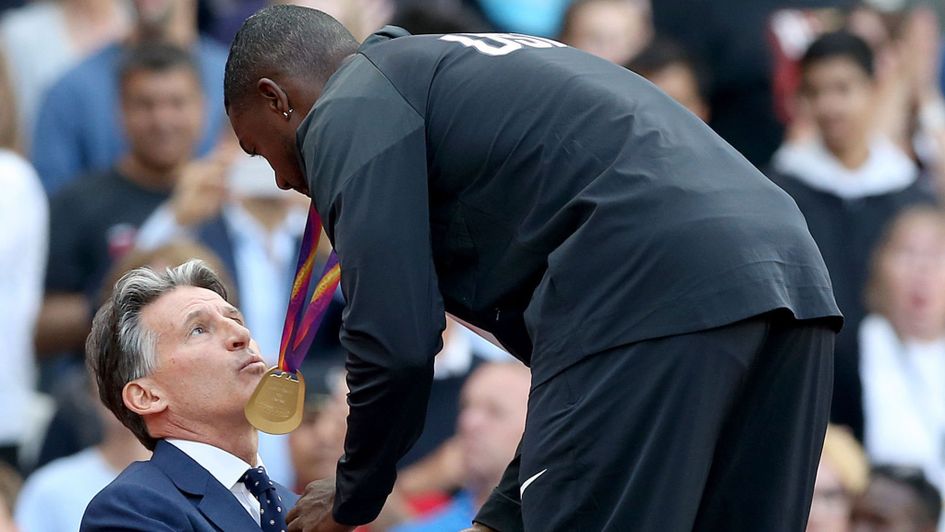Justin Gatlin was jeered on to the top of podium as the least popular 100 metres world champion in history returned to the London Stadium to be presented with his gold medal by Lord Coe.
The two-time drug cheat escaped the expected barrage of boos, with plenty of cheers helping to drown out the hostile reaction, but the applause was of course nothing in comparison to the ovation afforded to Usain Bolt, stood to his left on the bronze medal step.
Gatlin blew a kiss to the crowd and clasped his hands together as he received his medal from world athletics chief Coe, who hours earlier had branded his triumph "not the perfect script".
Speaking on BBC 5 Live's Sportsweek, the president of world athletics' governing body said: "I'm hardly going to sit here and tell you I'm eulogistic that somebody that has served two bans in our sport would walk off with one of our glittering prizes."
But on Sunday night the 35-year-old was not greeted by quite the cacophony of boos that his every previous appearance in the stadium had been, particularly his victory over Bolt in 9.92 seconds some 21 hours earlier.
Perhaps the retiring Jamaican's post-race words - "He deserves to be here, because he's done his time," said Bolt - had had some effect.
Click here for our take on Usain Bolt's defeat and the message it sends
There was confusion earlier over whether the medal ceremony had been shifted from a prime spot in the middle of the evening session to its time of 6.50pm, 10 minutes before the action got under way.
Initially it appeared it had, with the assumption being the change was due to fears over the reception Gatlin would receive.
But the IAAF insisted the time was not changed, with the mix-up blamed on an admin error.
There remains no doubt, however, that Gatlin's gold is a storyline athletics could do without.
There is no hiding from the embarrassment that the unrepentant American's victory will cause to a sport still struggling to regain credibility in the wake of repeated doping scandals.
Gatlin was effusive and gracious in his praise of bronze medallist Bolt after the race, bowing down to him on the track and lauding him in interviews, but for the victory himself, sorry still seems to be the hardest word.
His first ban in 2001 he blamed on an amphetamine contained in attention deficit disorder medication. The second in 2006, which resulted in a four-year suspension, reduced from eight on appeal, he attributed to a testosterone massage cream applied to his body without his knowledge.
Remorse has not been forthcoming - and still, at least publicly, is not.
He insisted his pariah status was undeserved and still refused to accept his gatecrashing of Bolt's farewell party as a setback for the sport.
He said: "I really don't need to understand.
"I can understand the rivalry that I have with Usain, but it's not a bitter rivalry. I respect the man and every time we come across the line I've shaken his hand, given him a hug and told him congratulations and that's all the really matters for me.
"I'm just a runner, I'm back in the sport, I've done my time.
"I've come back, did community service, I talked to kids and inspired kids about the right path. That's all I can do.
"Society does that for people who have made mistakes and I hope track and field can understand that to. That's why I'm back in the sport and that's why I'm still running."
Asked about his "bad boy" reputation, Gatlin added: "What do I do that makes me a bad boy?
"Do I talk bad about anybody? Do I give bad gestures? I don't. I shake every athlete's hand. I congratulate them, I tell them good luck. That doesn't sound like a bad boy to me.
"It seems like the media want to sensationalise it and make me a bad boy because Usain is the hero. That's fine, I know you've got to have a black hat and a white hat, but guys, come on.
"I keep it classy and I never talk bad. I try to inspire other athletes. I don't see where the bad boy comes from."
Related Athletics Links
A positive spin on Bolt's defeat
Usain Bolt sticks up for Gatlin
Prescod: Boos helped Gatlin
London 2017: Daily schedule
